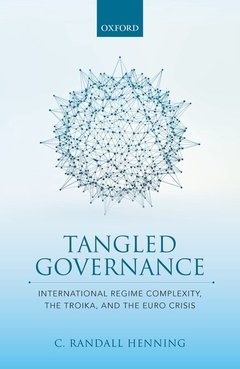Tangled Governance International Regime Complexity, the Troika, and the Euro Crisis
Langue : Anglais
Auteur : Henning C. Randall

Tangled Governance addresses the institutions that were deployed to fight the euro crisis, reestablish financial stability in Europe, and prevent contagion to the rest of the world. Henning explains why European leaders chose to include the International Monetary Fund (IMF) in the crisis response and provides a detailed account of the decisions of the institutions that make up the troika (the European Commission, European Central Bank, and IMF). He examines the institutions negotiating strategies, the outcomes of their interaction, and the effectiveness of their cooperation. The institutional strategies of key member states, including Germany and the United States, are also explored in this study. The book locates its analysis within the framework of regime complexity, involving clusters of overlapping and intersecting regional and multilateral institutions. It tests conjectures in the regime-complexity literature against the seven cases of financial rescues of euro area countries that were stricken by crises between 2010 and 2015. Tangled Governance concludes that states use some institutions to control others, that complexity is the consequence of a strategy to control agency drift. States mediate conflicts among institutions and thereby limit fragmentation of the regime complex and underpin substantive efficacy. In reaching these conclusions, the book also answers several key puzzles, including why Germany and other northern European countries supported IMF inclusion despite its adopting positions opposed to their preferences; why crisis fighting arrangements endured intense conflicts among the institutions; and, finally, why the United States and the IMF promoted further steps to complete the monetary union.
C. Randall Henning is Professor of International Economic Relations in the School of International Service at American University in Washington, D.C. He specializes in International Political Economy, Global Governance, and regional integration, especially with respect to Europe and East Asia. Europe's monetary union and the interaction among regional and multilateral institutions are topics of special focus. The author of numerous books and journal articles, he has written most recently on emerging-market perspectives on the Group of Twenty (G20) and international financial institutions, regional financial facilities, and the lessons for Europe from fiscal federalism in the United States.
Date de parution : 04-2017
Ouvrage de 316 p.
16.5x24 cm
Épuisé
Thèmes de Tangled Governance :
© 2024 LAVOISIER S.A.S.



